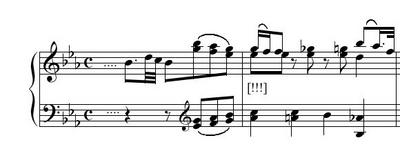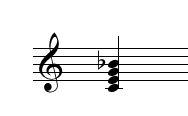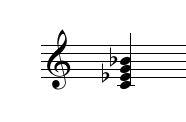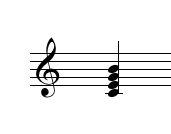I’m having a weird sensation tonight. My last day in Vermont, I felt as though I had a million kazillion things to write about, material for an infinity of blogs, and I felt this immense desire to write it all down (no way to get it down fast enough). Now I have had four days to “recover” in the city, and I feel that the valves that were open are now closed, closing, vanishing. My body is awake, sniffing around like a dog on the hunt, restless, aggressive, but my mind has no clue, is a neglectful, lazy master. So that my prey–the ideas I had, their realizations–have had the luxury of running far away, since the dogs do not follow closely; they scurry and find their impregnable hiding places.
But, I am posting anyway.
In one of my very favorite poems, Pound (as “translator”) alternates visions of joyful meetings and hopeless farewells. There seems to be no structure, except this chain, this gobbledygook of “we met, then we left, then we met, then we left…” ad infinitum. And each time it seems like the last farewell, and then somehow they manage to meet again, and the meeting is wonderful again, but different–each time different/same (Barthes’ “let us begin again”). The chain calls to mind for me the first movement of Mahler’s Ninth Symphony, which alternates what seem to be happy, if loaded, memories (nostalgic lyrical passages) with premonitions of death. They were written very close to the same time, if you don’t count that Pound was working (loosely, rhapsodically) from Chinese verse well over a thousand years old. We can well understand preoccupation with farewell and death in the period just before and during World War I, but how do we understand this episodic structure? In the Mahler, I find it difficult to settle on the “most important” memory, the “most catastrophic” premonition; the tale is too long for an abstract, for an outline, too unmanageable to graph or compare… it is a series of events, cycles, uncategorizable in some ways like life. Writing out “life” skirts tedium, and it is a miracle that I don’t find either work tedious, though I feel and love their loosenesses intensely, like a stretched-out, worn out piece of clothing that you wear into the ground. So that when they meet the first time–
By the south side of the bridge at Ten-Shin.
–and–
… were drunk for month on month, forgetting the kings and princes.
Intelligent men came drifting in from the sea and from the west border,
And with them, and with you especially
there was nothing at cross purpose,
And they made nothing of sea-crossing or of mountain-crossing,
If only they could be of that fellowship…
–I am not at all spoiled for the later times, when
In the storied houses of San-Ko they gave us more Sennin music,
Many instruments, like the sound of young phoenix broods.
The foreman of Kan Chu, drunk, danced
because his sleeves wouldn’t keep still.
–and the still later time:
Pleasure lasting, with courtezans, going and coming without hindrance,
With the willow flakes falling like snow,
Adn the vermilioned girls getting drunk about sunset,
Adn the water, a hundred feet deep, reflecting green eyebrows…
–for each time Pound’s brutal ending to the festivities is as beautiful as brutal can be–
With that music playing …
And I, wrapped in brocade, went to sleep with my head on his lap,
And my spirit so high it was all over the heavens,
And before the end of the day we were scattered like stars, or rain.
–or–
… then I was sent off to South Wei,
smothered in laurel groves,
And you to the north of Raku-hoku,
Till we had nothing but thoughts and memories in common.
–or–
And the wind lifting the song, and interrupting it,
Tossing it up under the clouds.
And all this comes to an end.
And is not again to be met with.
This (the Exile’s Letter from Pound’s collection of translations entitled Cathay) is the power of alternation; each phrase (to perpetrate musical semantics on a poem) concludes with a “deceptive cadence,” a denial (party’s over), the opposite direction, a reversal; but Pound’s language is most assured, most vivid at these moments. The awful recurrences of reality, necessity, the need to part, the impossibility of being together, coincide with the most beautiful, clear, lyrical nodes in the verse. Including this final, unbelievable passage:
And if you ask how I regret that parting:
It is like the flowers falling at Spring’s end
Confused, whirled in a tangle.
What is the use of talking, and there is no end of talking,
There is no end of things in the heart.
Now, at 35, I can see something peculiar in the fact that as an Oberlin student, from the tender age of 16, I would indulge in the last days of each school year in a nostalgic free-for-all: I had a tape of Strauss’ Four Last Songs which I would blast again and again out my dorm windows, and it had also the trio from Rosenkavalier, and there was some late Brahms piano music also, I think, and oh I forget what else. And my then off-again-on-again significant other Polly would come into my room and make herself useless while I packed, interjecting snide comments, and I would babble at her about memories and the year gone by and where has it gone. Time flew and “all this comes to an end and is no longer to be met with.” Nowadays I am a little less prone to this sort of thing, though it takes me unawares. I have been listening today to CDs of my Marlboro performances (Mozart Wind Quintet), presumably to educate myself, but partly of course to enjoy myself. Oh God you’re thinking, he’s having an attack of Marlboro nostalgia. No. I found myself listening and thinking “this is what I have said, this is what I have done, this is what I am aiming for…” (musically) and though I like some of it, most of me thinks, “There is no end of things in the heart,” and a small corner of me wonders: “What is the use of talking”? Cause there is always more in the phrase to say, and it’s exhausting. The Mozart phrase I was talking about yesterday on the blog: I listened to myself play it with a certain conviction, and was immediately convinced of an absolutely opposite way of playing/thinking about it.
Some music tries to get away from alternation and dualism, overblown oppositional rhetoric, to the endless gradual process (say, Steve Reich), so that the changes are “unnoticeable” which is all very cool. But perhaps unlifelike? Piano-Phase feels like music to me, while Mahler’s Ninth feels like life. Changes are very noticeable, I’d say. “Something else” always happens. Again and again. (And we begin again). Yet another premonition, yet another memory. Last week in Vermont was something, and this week in New York is other, to be sure; I can’t for the life of me decide which one to be nostalgic for.








